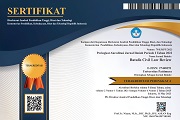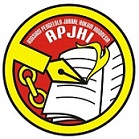Optimizing the Improvement of Judge Competence in Settlements of Sharia Economic Disputes in Religious Courts
 ), Dadang Suprijatna(3)
), Dadang Suprijatna(3)
(1) Faculty of Law Djuanda University, Bogor, Indonesia

(2) Faculty of Law Djuanda University, Bogor, Indonesia
(3) Faculty of Law Djuanda University, Bogor, Indonesia
 Corresponding Author
Corresponding Author
Abstract
Introduction: This is motivated by the increasingly widespread sharia economic disputes being handled by the Religious Courts, so that an institution is needed that can create the character of judges that are in accordance with the expectations of society. The institution is the Research and Development Agency for Legal and Judicial Education and Training of the Supreme Court of the Republic of Indonesia (Balitbang Diklat Kumdil MA-RI).
Purposes of the Research: This paper describes the legal symptoms or legal facts related to the ability of religious court judges to decide cases related to sharia economics and studies the education and training curriculum for judges within the scope of the Supreme Court of the Republic of Indonesia No. 4 of 2019 concerning Procedures for Simple Claims and Supreme Court Regulation No. 14 of 2016 concerning Procedures for Settlement of Sharia Economic Disputes
Methods of the Research: This paper uses a normative juridical approach.
Results of the Research: Implementation of the curriculum at the Ministry of Education and Training Research and Development of the Supreme Court ‘Kumdil’ aims to improve the ability to organize training. The capacity building referred to is one of the certifications of sharia economic judges which is aimed at forming the quality of judges' resources in the technical field of justice who are professional, have integrity and are independent in resolving sharia economic disputes.
Keywords
DOI
10.47268/ballrev.v4i2.1718
Published
2023-12-02
How To Cite
@article{BALLREV1718,
author = {Deby Adelia and Ani Yumarni and Dadang Suprijatna},
title = {Optimizing the Improvement of Judge Competence in Settlements of Sharia Economic Disputes in Religious Courts},
journal = {Batulis Civil Law Review},
volume = {4},
number = {2},
year = {2023},
keywords = {Legal Protection; Traditional Knowledge; Sui Generis.},
abstract = {Introduction: This is motivated by the increasingly widespread sharia economic disputes being handled by the Religious Courts, so that an institution is needed that can create the character of judges that are in accordance with the expectations of society. The institution is the Research and Development Agency for Legal and Judicial Education and Training of the Supreme Court of the Republic of Indonesia (Balitbang Diklat Kumdil MA-RI).Purposes of the Research: This paper describes the legal symptoms or legal facts related to the ability of religious court judges to decide cases related to sharia economics and studies the education and training curriculum for judges within the scope of the Supreme Court of the Republic of Indonesia No. 4 of 2019 concerning Procedures for Simple Claims and Supreme Court Regulation No. 14 of 2016 concerning Procedures for Settlement of Sharia Economic DisputesMethods of the Research: This paper uses a normative juridical approach.Results of the Research: Implementation of the curriculum at the Ministry of Education and Training Research and Development of the Supreme Court ‘Kumdil’ aims to improve the ability to organize training. The capacity building referred to is one of the certifications of sharia economic judges which is aimed at forming the quality of judges' resources in the technical field of justice who are professional, have integrity and are independent in resolving sharia economic disputes.},
issn = {2746-8151}, pages = {168--182} doi = {10.47268/ballrev.v4i2.1718},
url = {https://fhukum.unpatti.ac.id/jurnal/ballrev/article/view/1718}
}
Journal Article
Fatorina, Endang Eko Wati; Fetri. “Endang Eko Wati Dan Fetri Fatorina, Kuasa Menjual Jaminan Pada Pembiayaan Akad Murabahah Bil Wakalah (Studi Analisis Perkara Nomor : 0001/Pdt.G.S/2020/PA.Pwt).” At-Turost: Journal of Islamic Studies 08, no. 01 (2021): 127.
Muaidi. “Penyelesaian Sengketa Dalam Hukum Ekonomi Syari’ah.” TAFAQQUH: Jurnal Hukum Ekonomi Syariah Dan Ahwal as Syakhsiyyah 5, no. 2 (n.d.): 6–7.
Nasution, Bahder Johan. “Sejarah Perkembangan Kekuasaan Kehakiman Indonesia.” Jurnal Inovatif 7, no. 3 (2014).
Ridwan, Muhammad. “Pola Penyelesaian Sengketa Perbankan Syariah Pada Pengadilan Agama Di Indonesia.” Jurnal Hukum Ekonomi Syariah 4, no. 2 (2020).
Suhaimi. “Eksekusi Hak Tanggungan Di Bank Syariah Pasca Undang-Undang Nomor 3 Tahun 2006.” Jurnal Qiyas 2, no. 1 (2017): 39.
Susylawati, Eka. “Landasan Hukum Positif Pemberlakuan Hukum Islâm Di Indonesia.” Jurnal Al-Ihkam VI, no. 1 (2011): 138–39.
Umam, Ahmad Khotibul. “Hukum Penyelesaian Sengketa Ekonomi Syariah Di Indonesia.” Jurnal Risalah 1, no. 1 (2016): 6.
Wiriadinata, Wahyu. “Komisi Yudisial Dan Pengawasan Hakim Di Indonesia.” Jurnal Hukum Dan Pembangunan 4, no. 4 (2013): 560.
Yenni Wiranti et. al. “Penerapan Gugatan Sederhana Dalam Penyelesaian Sengketa Ekonomi Syariah.” Jurnal Hukum Islam 20, no. 2 (2020): 161–62.
Yumarni, Ani. “Kesadaran Hukum Masyarakat Dalam Perkara Mediasi Berdasarkan PERMA No 01 Tahun 2008.” Jurnal Sosial Humaniora 5, no. 2 (2014): 58–59.
———. “Tinjauan Hukum Status Wali Atas Perkawinan Anak Angkat.” Jurnal Hukum De’Rechtsstaat 1, no. 1 (2015): 13.
Book
Ahmad Kamil; M Fauzan. Kaidah-Kaidah Hukum Yurisprudensi. Jakarta: Khairulbayan, 2004.
Attamimi, Abdul Hamid S. Kedudukan Kompilasi Hukum Islam Dalam Sistem Hukum Nasional. Jakarta: Gema Insani Press, 2008.
Azizy, Qodri. Eklektisisme Hukum Nasional: Kompetisi Antara Hukum Islam Dan Hukum Umum. Yogyakarta: Gama Media, 2002.
Hasan, Hasbi. Kompetensi Peradilan Agama Dalam Penyelesaian Sengketa Ekonomi Syariah. Jakarta: Gramata Publishing, 2010.
Lubis, Sahrawandi K. Etika Profesi Hukum. Jakarta: Sinar Grafika, 2012.
Manan, Abdul. Etika Hakim Dalam Menyelenggarakan Peradilan: Suatu Kajian Dalam Sistem Peradilan Islam. Jakarta: Prenada Media Group, 2007.
———. Penerapan Hukum Acara Perdata Di Lingkungan Peradilan Agama. Jakarta: Prenada Media, 2015.
Mertokusumo, Sudikno. Mengenal Hukum Suatu Pengantar. Bandung: Citra Aditya Bakti, 2009.
Mustafa, Wildan Suyuthi. Kode Etik Hakim. Jakarta: Prenada Media Group, 2013.
Pitlo, Sudikno Mertokusumo dan A. Bab-Bab Tentang Penemuan Hukum. Bandung: Citra Aditya Bakti, 2013.
Sururi, Ramdani Wahyu. Sosiologi Hukum: Perspektif Baru Studi Hukum Dalam Masyarakat. Tp. Bandung, 2006.
Sutiyoso, Bambang. Aktualita Hukum Dalam Era Reformasi. Jakarta: Raja Grapindo Persada, 2004.
Usman, Suparman. Hukum Islam: Asas-Asas Dan Pengantar Studi Hukum Islam Dalam Tata Hukum Indonesia. Jakarta: Gaya Media Pratama, 2011.
Yumarni, Ani. Mediasi Dalam Perkara Perceraian Di Pengadilan Agama. Depok: Raja Grafindo Persada, 2019.
Thesis, Online/World Wide Web and Others
A Rahman H. I. “Sistem Politik Indonesia,” 215. Yogyakarta, 2007.
Furqonsyah, M. “Kompetensi Hakim Peradilan,” 2023.
Hermansyah. “Membedah PERMA Tata Cara Penyelesaian Perkara Ekonomi Syariah.” Mahkamah Agung RI, 2021. www.badilag.mahkamahagung.go.id.
PEKKA, Tim Peneliti PEKKA & USAID. “Akses Terhadap Keadilan: Pemberdayaan Perempuan Kepala Keluarga Di Indonesia.” Jakarta, 2010.
Restudiyani. “Kedudukan Jaminan Dalam Sengketa Pembiayaan Syariah Pada Putusan Pengadilan Agama Di Daerah Istimewa Yogyakarta.” In The National Conferences Management and Business (NCMAB), 599, 2018.
RI, Mahkamah Agung. “Badan Penelitian Dan Pengembangan KUMDIL,” 2018.| Dublin Core | PKP Metadata Items | Metadata for this Document | |
| 1. | Title | Title of document | Optimizing the Improvement of Judge Competence in Settlements of Sharia Economic Disputes in Religious Courts |
| 2. | Creator | Author's name, affiliation, country |
Deby Adelia; Faculty of Law Djuanda University, Bogor; Indonesia  |
| 2. | Creator | Author's name, affiliation, country | Ani Yumarni; Faculty of Law Djuanda University, Bogor; Indonesia |
| 2. | Creator | Author's name, affiliation, country | Dadang Suprijatna; Faculty of Law Djuanda University, Bogor; Indonesia |
| 3. | Subject | Discipline(s) | |
| 3. | Subject | Keyword(s) | Legal Protection; Traditional Knowledge; Sui Generis. |
| 4. | Description | Abstract | Introduction: This is motivated by the increasingly widespread sharia economic disputes being handled by the Religious Courts, so that an institution is needed that can create the character of judges that are in accordance with the expectations of society. The institution is the Research and Development Agency for Legal and Judicial Education and Training of the Supreme Court of the Republic of Indonesia (Balitbang Diklat Kumdil MA-RI).Purposes of the Research: This paper describes the legal symptoms or legal facts related to the ability of religious court judges to decide cases related to sharia economics and studies the education and training curriculum for judges within the scope of the Supreme Court of the Republic of Indonesia No. 4 of 2019 concerning Procedures for Simple Claims and Supreme Court Regulation No. 14 of 2016 concerning Procedures for Settlement of Sharia Economic DisputesMethods of the Research: This paper uses a normative juridical approach.Results of the Research: Implementation of the curriculum at the Ministry of Education and Training Research and Development of the Supreme Court ‘Kumdil’ aims to improve the ability to organize training. The capacity building referred to is one of the certifications of sharia economic judges which is aimed at forming the quality of judges' resources in the technical field of justice who are professional, have integrity and are independent in resolving sharia economic disputes. |
| 5. | Publisher | Organizing agency, location | Faculty of Law, Universitas Pattimura |
| 6. | Contributor | Sponsor(s) | |
| 7. | Date | (YYYY-MM-DD) | 2023-12-02 |
| 8. | Type | Status & genre | Peer-reviewed Article |
| 8. | Type | Type | |
| 9. | Format | File format | |
| 10. | Identifier | Uniform Resource Identifier | https://fhukum.unpatti.ac.id/jurnal/ballrev/article/view/1718 |
| 10. | Identifier | Digital Object Identifier | 10.47268/ballrev.v4i2.1718 |
| 11. | Source | Title; vol., no. (year) | Batulis Civil Law Review; Vol 4, No 2 (2023): VOLUME 4 ISSUE 2, NOVEMBER 2023 |
| 12. | Language | English=en | en |
| 13. | Relation | Supp. Files |
Untitled (83KB) |
| 14. | Coverage | Geo-spatial location, chronological period, research sample (gender, age, etc.) | |
| 15. | Rights | Copyright and permissions | Copyright: Authors who publish their manuscripts in this Journal agree to the following conditions: 1. The copyright in each article belongs to the author, as well as the right to patent. 2. Authors are able to enter into separate, additional contractual arrangements for the non-exclusive distribution of the journal's published version of the work (e.g., post it to an institutional repository or publish it in a book), with an acknowledgment of its initial publication in this journal. 3. Authors are permitted and encouraged to post their work online (e.g., in institutional repositories or on their website) prior to and during the submission process, as it can lead to productive exchanges, as well as earlier and greater citation of published work. 4. Authors have the right to self-archiving of the article (Author Self-Archiving Policy)
Licence : Batulis Civil Law Review Journal is disseminated based on the Creative Commons Attribution-NonCommercial 4.0 International license terms. This license allows anyone to copy and redistribute this material in any form or format, compose, modify, and make derivatives of this material for any purpose. You cannot use this material for commercial purposes. You must specify an appropriate name, include a link to the license, and certify that any changes have been made. You can do this in a way that is appropriate, but does not imply that the licensor supports you or your use.
|
Copyright (c) 2023 Deby Adelia, Ani Yumarni, Dadang Suprijatna

This work is licensed under a Creative Commons Attribution-NonCommercial 4.0 International License.

 : 1925 times
: 1925 times Download : 846 times
Download : 846 times














